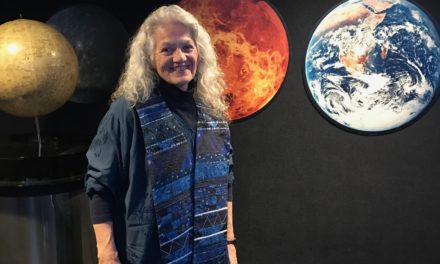The first time I attempted meditation, I almost panicked. The leader had asked us to fix our half-shut, unfocused eyes on the floor for fifteen minutes and watch our breath exit our nostrils. He also said, “Don’t attach yourselves to any thoughts entering your minds. Let them pass through, neither reacting to nor dialoguing with them.”
It wasn’t until I tried this simple meditation that I realized how dependent I was on my thoughts. I needed to identify with and be carried along by their flow, engaged in a constant inner chatter, just as some people keep on a radio or TV they aren’t actually listening to for the white noise—to fill the empty spaces.
Of course, avoiding a dialogue with our inner selves has become easy with smart phones and all the other gadgets we can plug into, leaving no spaces for the aloneness that the theologian Paul Tillich discussed in a chapter on “Loneliness and Solitude” in The Eternal Now. In it, he makes penetrating observations about the plight of the modern person. He says,
…today, more intensely than in preceding periods, man is so lonely that he cannot hear solitude. And he tries desperately to become a part of the crowd. Everything in our world supports him. It is a symptom of our disease that teachers and parents and the managers of public communication do everything possible to deprive us of the external conditions for solitude, the simplest aids to privacy…an unceasing pressure attempts to destroy even our desire for solitude.
 Tillich wrote this book long before the technological toys we currently possess existed. They make his observations even more prescient. Those of us who have spiritual yearnings, a desire to know the divine, however we may identify it, could be in serious trouble.
Tillich wrote this book long before the technological toys we currently possess existed. They make his observations even more prescient. Those of us who have spiritual yearnings, a desire to know the divine, however we may identify it, could be in serious trouble.
Tillich points out that God wants to “penetrate to the boundaries of our being, where the mystery of life appears, and it can only appear in moments of solitude…” He concludes the chapter by daring the reader to risk knowing God by facing the eternal, and in the process to find ourselves, our true selves, not the false layers we wear as protection against God and our fellow human beings. Eknath Easwaran, a spiritual teacher and an author of meditation books, writes in Passage Meditation: Bringing the Deep Wisdom of the Heart into Daily Life, “Every major religion emphasizes this: to realize God, we must quiet the mind. As the Bible says, ‘Be still and know that I am God.’”
To live with such awareness requires that we be awake, not easy if we’ve spent most of our lives sleeping. It’s not surprising that while we think we spend our “waking” hours in a conscious state, we are largely unconscious, using distractions to fill our time. The moment we get up in the morning, we jump on a treadmill of action that doesn’t let up till we fall asleep at night. It’s not an easy habit to break.
For those who find wisdom in the Bible, a passage in Mark 13:33-37 quotes Jesus warning us to, “Be alert, be wakeful…for you do not know when the master of the house is coming. Evening or midnight, cock-crow or early dawn—if he comes suddenly, he must not find you asleep. And what I say to you, I say to everyone. Keep awake.” The urgency of this passage impressed itself on me years ago when I was still a practicing Christian and attending a pre-Easter Bible study. I felt the words were addressing me directly, one of those rare epiphanies.
But I also recognized how difficult it was to be awake in the sense of this message. It means living as though your life depended on it instead of sleepwalking through your days. I didn’t want to give up sleepwalking, yet I was curious about how I might wake up.
While I was regularly attending a Protestant church, I couldn’t find methods within the institution to help me follow this Biblical urging. There were adult and children Bible studies, but there were no opportunities to learn or practice meditation, even prayerful meditation, or any other spiritual discipline that would open the individual to the still, small voice within.
My quest to find opportunities to grow spiritually led me to an Episcopal retreat center in Inverness, California. Seekers were invited to stay there for formal or informal retreats (with or without groups). Food was provided as well as sleeping facilities. So, too, was a quiet environment where visitors observed silence during their entire stay. Surprisingly, the silence created an intimacy with others on a retreat that I hadn’t expected.
Words can prevent us from communing on a deeper level than can happen through eye contact, body language, and touch—if we allow it. This “if” is a big precondition. There has to be some willingness to meet others and ourselves before it can happen. This realization led me to the mediation class I mentioned earlier and a quest for other ways of following Socrates’ admonition, “know thyself.” This included entering Jungian therapy and also paying closer attention to my nightly dreams.
we allow it. This “if” is a big precondition. There has to be some willingness to meet others and ourselves before it can happen. This realization led me to the mediation class I mentioned earlier and a quest for other ways of following Socrates’ admonition, “know thyself.” This included entering Jungian therapy and also paying closer attention to my nightly dreams.
My explorations also led me to Eastern religions. They tend to stress personal experience acquired through spiritual disciplines that can take the practitioners further inside while transcending the limitations of the personality. Hinduism recognizes many paths to God that are chosen based on a person’s personality. Huston Smith, in The Religions of Man, notes that the appropriate yoga practice is “a method of training designed to lead to integration or union…,” for “yoga comes from the same root as the English word yoke. Yoke carries a double connotation: to unite (yoke together) and to place under discipline or training (to being under the yoke, take my yoke upon you).”
Utmost in the yogi’s training is the attempt to bring the senses and mind under control so that his/her attention inward will not be filled with distraction: the Upanishads observe, “Man…looks toward what is outside, and sees not the inward being. Rare is the wise man who…shuts his eyes to outward things and so beholds the glory of the Atman within.” The Bhagavadgita echoes this sentiment:
Only that yogi
whose joy is inward,
inward his peace,
and his vision inward
shall come to Brahman
and know Nirvana.
Another religion that stresses experience is Zen Buddhism. Concerned with getting the practitioner to see beyond the finger pointing at the moon to apprehending the moon itself, Zen masters insist on living experience. Smith points out,
Zen is not interested in theories about enlightenment; it wants to plunge its practitioners into enlightenment itself. The shouts, the buffets, the reprimands that figure in Zen training have nothing to do with ill-will. They are designed to help the student crash the word-barrier; to startle his mind out of conventional sluggishness into the heightened, more alert perception that will lead to enlightenment.
Or to quote from the Bible, “Not everyone who says to me, ‘Lord Lord’ shall enter the kingdom.”
Just what is the nature of this kingdom, and why don’t all professing Christians experience it? I believe there’s a parallel between what Eastern religions call “enlightenment” and what some in the West call “the kingdom of heaven.” In Creativity and Taoism, Chung-yuan Chang defines enlightenment as being “the uncovering of hitherto unknown powers of the mind,” Similarly, the “kingdom of heaven,” which is a level above humanity, is within. It is a higher level inside each individual, higher than the ordinary earth-bound/sensual existence we are born into. Both enlightenment and the kingdom of heaven turn the focus from the external, temporal finite world toward the internal, eternal, and infinite realm.
 The outer world represents all that is known and safe. There’s the bank down at the corner where I deposit my money; the shopping center where I stock up on my material needs; the restaurant where I have biological and social interchange; the bookstore where I can find out more about the visible world; the school that teaches me how to adapt myself to society; the friends who share my interests and values; and the church that confirms what I see in the world, offering me a community of believers who are as afraid as I am of the unknown, of the mysteries lurking within. Keep the noise level high so we won’t have to hear the silence within.
The outer world represents all that is known and safe. There’s the bank down at the corner where I deposit my money; the shopping center where I stock up on my material needs; the restaurant where I have biological and social interchange; the bookstore where I can find out more about the visible world; the school that teaches me how to adapt myself to society; the friends who share my interests and values; and the church that confirms what I see in the world, offering me a community of believers who are as afraid as I am of the unknown, of the mysteries lurking within. Keep the noise level high so we won’t have to hear the silence within.
Since fear seems to be the main obstacle to turning within, it’s the first thing we must face if we want to live more consciously. If I had bolted during my first meditation session, I would still be running. Anxiety can be a great warning system to protect us from real threats, but it also can take over our lives, preventing us from taking the steps necessary to live as though our lives depended on it.
But fear also can be a great motivator, prompting us to challenge the many distractions that keep us from living less than a fully awake life, one where we try to hear those small voices within that want equal representation. I take those steps every day, afraid of falling asleep again.







